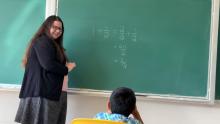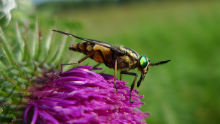Four UBC Science doctoral students have received prestigious Vanier Canada Scholarships--Canada's equivalent of Britain's Rhodes scholarship--to study biodiversity, nuclear physics, cell sequencing for cancer research, and the mathematical sciences.
The four scholarships are among 17 awarded at UBC in the program's inaugural year. The winners will receive $50,000 a year for up to three years to support their graduate studies. UBC has the second highest number of scholars, after the University of Toronto.
The new UBC Science Vanier Scholars are:
Cindy Blois (Canada) Mathematics Functional integral representations and many-particle systems
Stephan Ettenauer (Austria) Physics and Astronomy Nuclear beta decays for tests of fundamental symmetries
Richard Fitzjohn (New Zealand) Zoology Macroevolutionary conflict: detecting the causes of variation in diversity
Ryan Morin (Canada) Science Massively parallel sequencing of diffuse large B-cell transcriptomes
"Graduate students play a vital role in the research enterprise here at UBC and around the world," says UBC President Stephen Toope. "Their contribution to the generation of new knowledge - both driven by innate curiosity and real-world applications - helps us better understand our world while providing important economic and social benefits."
Launched last year, the Vanier Canada Scholarships program is administered by the country's three federal research granting agencies - the Canadian Institutes of Health Research, the Natural Sciences and Engineering Research Council and the Social Sciences and Humanities Research Council. At full capacity, the program will support up to 500 doctoral students from Canada and abroad annually.
Nominees are evaluated through peer-review and selected by a board of world-renowned Canadian and international experts that includes former UBC President Martha Piper and Bombardier board chair Laurent Beaudoin.
Musqueam First Nation land acknowledegement
We honour xwməθkwəy̓ əm (Musqueam) on whose ancestral, unceded territory UBC Vancouver is situated. UBC Science is committed to building meaningful relationships with Indigenous peoples so we can advance Reconciliation and ensure traditional ways of knowing enrich our teaching and research.
Learn more: Musqueam First Nation
Faculty of Science
Office of the Dean, Earth Sciences Building2178–2207 Main Mall
Vancouver, BC Canada
V6T 1Z4


